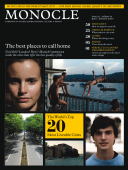
Issue 5
The best places to call home: New York? London? Paris? Munich? Monocle ranks the cities that offer the best quality of life.
In This Issue
Oops! No content was found.
Looks like we no longer have content for the page you're on. Perhaps try a search?
Return Home

